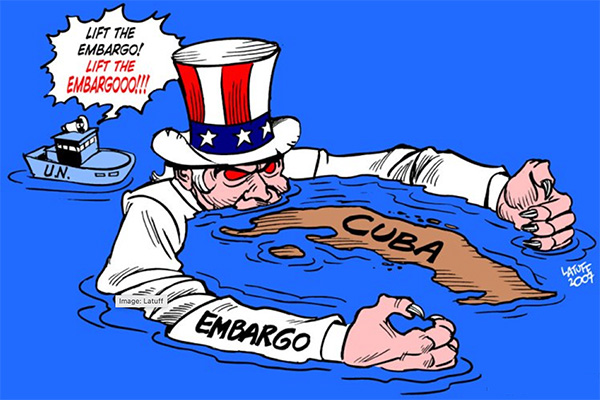
Díaz-Canel Characterized Blockade As Part of a “Tightened Siege” Resulting from An “Unjust International Order”
On September 14, President Joe Biden announced the extension of the U.S. blockade of Cuba for another year, until at least September 14, 2024.
In a memorandum directed to the Secretary of State and Secretary of the Treasury, Biden proclaimed that this blockade, whose aim is to weaken Cuba’s economy by restricting trading opportunities and barring imports onto the island, was “in the national interest of the United States.”
Cuban President Miguel Díaz-Canel responded on September 15 by giving an impassioned speech at the Group of 77+China Summit in Havana attended by representatives from more than 100 countries that referred to the embargo as being of part of a “tightened siege” resulting from an “unjust international order” in which Cuba is “not the only one” to suffer.
Four days later, speaking before the UN General Assembly in New York, Díaz-Canel said that the “Cuban people resist and creatively win this ruthless economic war, which since 2019, amid the pandemic, was opportunistically escalated to an even more extreme dimension” including by efforts to prevent global financial institutions from doing business with Cubans and by “cutting off supplies of fuel and lubricants to Cuba and preventing access to medical equipment with more than 10 percent U.S. components.”
Díaz-Canel noted that this was “a real siege accompanied by a powerful political destabilization machinery, with million-dollar funds approved by the United States Congress to capitalize on the shortcomings caused by the blockade and undermine constitutional order and citizen’s tranquility.” Cuba is not the first country to be affected [by U.S. economic warfare],” according to Díaz-Canel, “but it is the one that has endured them for the longest time despite the global condemnation that is expressed almost unanimously every year at this Assembly.”
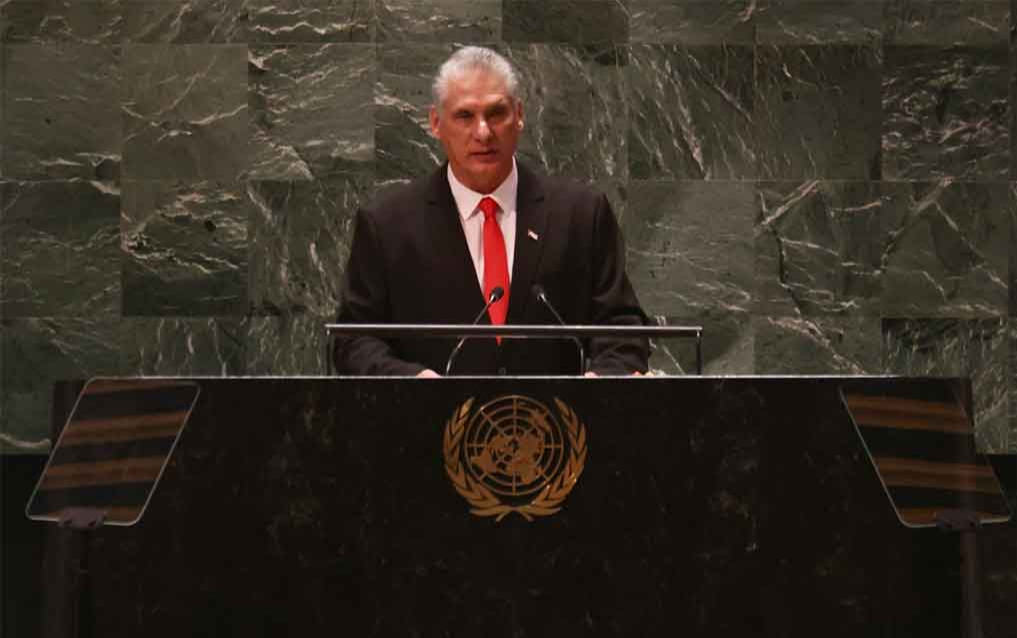
Indeed, last November, 185 nations voted for a UN resolution demanding an end to Washington’s Cuba blockade, with only the U.S. and Israel voting against it and Ukraine and Brazil (under then-President Jair Bolsonaro) abstaining.
During the first 14 months of the Biden administration, the damage to the Cuban economy from the embargo was estimated at $6.35 billion, equivalent to more than $15 million a day.
Yuri Gala López, the Ambassador of the Permanent Mission of Cuba to the UN, has said that the embargo costs Cubans $455 million per month.
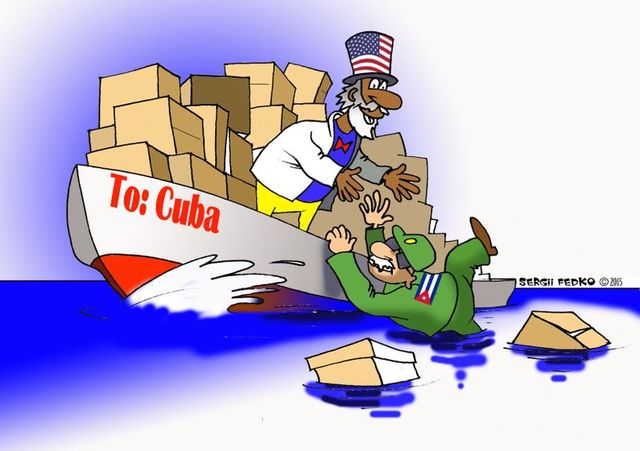
According to some sources, conditions in Cuba are now worse than in the so-called “Special Period” in the 1990s after the fall of the Soviet Union. Food shortages were so dire then that malnutrition led to an epidemic disease of blindness afflicting tens of thousands.
Cubans today are suffering from renewed food shortages, along with blackouts and soaring inflation, with exports down more than 35% compared to last year. Because of the blockade, farmers are deprived of needed technologies and have difficulty exporting their products.
Transportation is also impeded and certain medicines and medical treatments are difficult to obtain.
The Biden administration has at least agreed to ease some restrictions on Cuba’s private sector by allowing Cuban entrepreneurs to open U.S. bank accounts.
Washington has long used sanctions and the blockade as a political weapons to punish Cuba for refusing to integrate into the Washington-dominated world order, and for instituting socialist policies that have provided a model for the rest of the Global South.
When anti-government protests broke out against the Cuban government in July 2021, they received support from the Biden administration. That year, the National Endowment for Democracy (NED), a CIA cutout, provided $5,538,193 in grants to opposition media and political groups in Cuba seeking regime change and in support of efforts to privatize Cuba’s largely state-run economy.
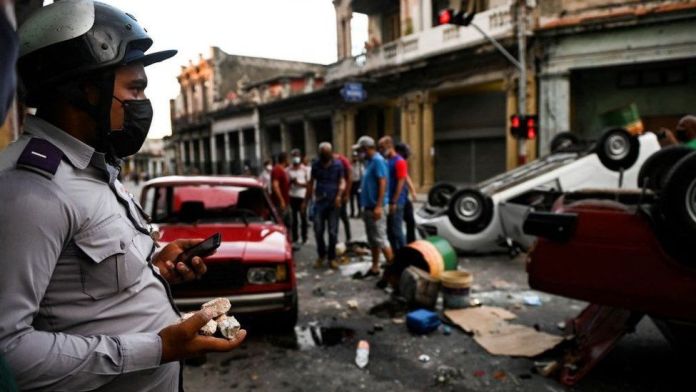
The U.S. regime-change playbook has been in place since 1960 following the triumph of the Cuban Revolution led by Fidel Castro, which toppled the U.S.-backed dictatorship of Fulgencio Batista and started to nationalize Cuba’s economy while advancing land reform and instituting free health care and education.


In an April 1960 memorandum, Lester D. Mallory, the Deputy Assistant Secretary of State for Inter-American Affairs, emphasized that, since the majority of Cubans supported Fidel Castro and there was no effective political opposition, the U.S. should try to undercut Castro’s support “through disenchantment and disaffection based on economic dissatisfaction and hardship” by denying “money and supplies to Cuba,” which would “decrease monetary and real wages, to bring about hunger, desperation, and the overthrow of [the Castro] government.”
Mallory’s memo provided the basis for U.S. foreign policy toward Cuba that remains essentially unchanged after six decades.
Joe Biden’s support for the embargo is unsurprising, as he has long courted the vote of the Cuban-American lobby. In 1996, as a U.S. Senator, he supported tightening the embargo through the Helms-Burton Act, which Fidel Castro called a “shameful” bill paving the way for “economic genocide.”[1]
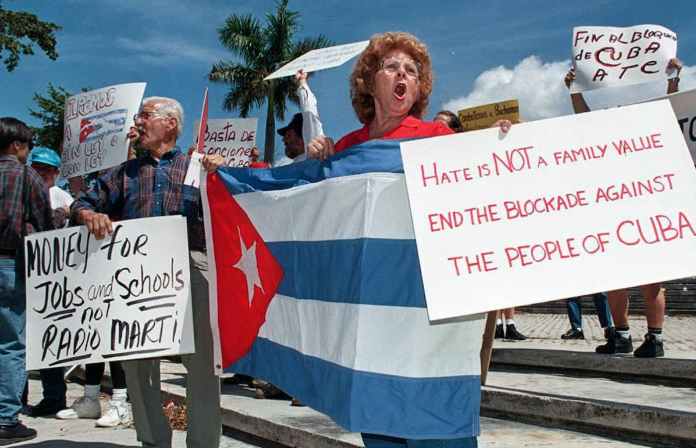
In an address before the UN summit for Sustainable Development on September 18, Cuban President Díaz-Canel said that the embargos directed against his and other countries constituted “a serious violation of the aims and principles of the UN Charter” and “seriously hamper the efforts of affected countries to achieve their economic development goals.”
Díaz-Canel added that demands to lift economic warfare measures have been “made repeatedly by Southern leaders. The lack of progress should not be attributed to the absence of solutions. The actions are there. What is urgently needed is the political will to ‘leave no one behind,’ and to overcome one of the most complex crises humanity has faced in modern history. This would be our best contribution to the common future we must build together!”
Sadly, the political will that Díaz-Canel hopes to see emerge is far off in the U.S. where a Cold War mentality still prevails and the anti-Castro lobby continues to wield political clout.
The media has helped distort public opinion by downplaying the significance of the U.S. embargo, making it seem like socialist policies are to blame for Cuba’s economic crisis when in reality the success of those policies has intensified Washington’s efforts to sabotage Cuba’s economy in order to affect regime change.

-
In addition to tightening economic sanctions, Helms-Burton increased support for Cuban exile groups and made it official U.S. policy to support regime change in Cuba. ↑
CovertAction Magazine is made possible by subscriptions, orders and donations from readers like you.
Blow the Whistle on U.S. Imperialism
Click the whistle and donate
When you donate to CovertAction Magazine, you are supporting investigative journalism. Your contributions go directly to supporting the development, production, editing, and dissemination of the Magazine.
CovertAction Magazine does not receive corporate or government sponsorship. Yet, we hold a steadfast commitment to providing compensation for writers, editorial and technical support. Your support helps facilitate this compensation as well as increase the caliber of this work.
Please make a donation by clicking on the donate logo above and enter the amount and your credit or debit card information.
CovertAction Institute, Inc. (CAI) is a 501(c)(3) non-profit organization and your gift is tax-deductible for federal income purposes. CAI’s tax-exempt ID number is 87-2461683.
We sincerely thank you for your support.
Disclaimer: The contents of this article are the sole responsibility of the author(s). CovertAction Institute, Inc. (CAI), including its Board of Directors (BD), Editorial Board (EB), Advisory Board (AB), staff, volunteers and its projects (including CovertAction Magazine) are not responsible for any inaccurate or incorrect statement in this article. This article also does not necessarily represent the views the BD, the EB, the AB, staff, volunteers, or any members of its projects.
Differing viewpoints: CAM publishes articles with differing viewpoints in an effort to nurture vibrant debate and thoughtful critical analysis. Feel free to comment on the articles in the comment section and/or send your letters to the Editors, which we will publish in the Letters column.
Copyrighted Material: This web site may contain copyrighted material the use of which has not always been specifically authorized by the copyright owner. As a not-for-profit charitable organization incorporated in the State of New York, we are making such material available in an effort to advance the understanding of humanity’s problems and hopefully to help find solutions for those problems. We believe this constitutes a ‘fair use’ of any such copyrighted material as provided for in section 107 of the US Copyright Law. You can read more about ‘fair use’ and US Copyright Law at the Legal Information Institute of Cornell Law School.
Republishing: CovertAction Magazine (CAM) grants permission to cross-post CAM articles on not-for-profit community internet sites as long as the source is acknowledged together with a hyperlink to the original CovertAction Magazine article. Also, kindly let us know at info@CovertActionMagazine.com. For publication of CAM articles in print or other forms including commercial internet sites, contact: info@CovertActionMagazine.com.
By using this site, you agree to these terms above.
About the Author

Jeremy Kuzmarov holds a Ph.D. in American history from Brandeis University and has taught at numerous colleges across the United States. He is regularly sought out as an expert on U.S. history and politics for radio and TV programs and co-hosts a radio show on New York Public Radio and on Progressive Radio News Network called “Uncontrolled Opposition.”
He is Managing Editor of CovertAction Magazine and is the author of six books on U.S. foreign policy, including Obama’s Unending Wars (Clarity Press, 2019), The Russians Are Coming, Again, with John Marciano (Monthly Review Press, 2018), Warmonger. How Clinton’s Malign Foreign Policy Launched the U.S. Trajectory From Bush II to Biden (Clarity Press, 2023); and with Dan Kovalik, Syria: Anatomy of Regime Change (Baraka Books, 2025).
Besides these books, Kuzmarov has published hundreds of articles and contributed to numerous edited volumes, including one in the prestigious Oxford History of Counterinsurgency .
He can be reached at jkuzmarov2@gmail.com and found on substack here.

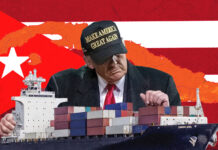


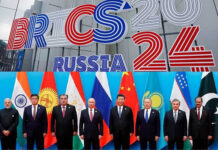
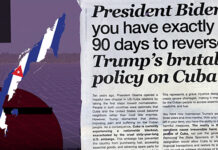
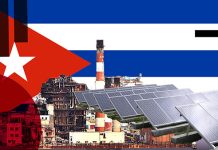




I seem to recall Nixon calling for an abandonment of the embargo shortly before his death.
Efforts to confirm this have not been successful, however.